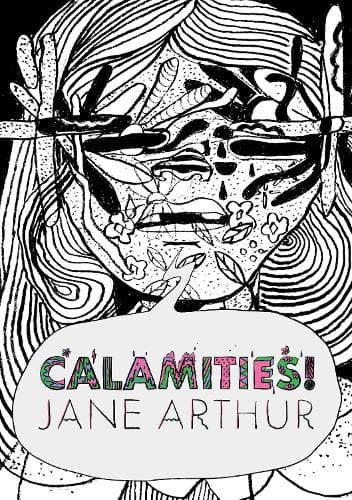Review: Calamities!
Reviewed by Erica Stretton
Calamities!, Jane Arthur’s second poetry collection, pulses with both humour and an impatient fatigue. Wrought with tension, splayed over a wide canvas from as far away as the planets right down to the minute details of dead flies, the 34 poems in the book contemplate climate change and the end of the world, the space we take up and the space between things under the sun. Anxiety and the relentlessness of life are evident throughout.
Arthur’s first collection, Craven, won the Jessie Mackay Prize for Best First Book of Poetry at the 2020 Ockham New Zealand Book Awards. It’s easy to see why, reading this second collection: details are sharply observed and a wry sensibility, a weariness of the big problems we cannot shift and how we move along regardless, runs through the poetry. The book is divided into three sections: Risk Assessment, The Bear and Highly Flammable.
Risk Assessment doesn’t shy away from confronting feelings. With poems entitled Crisis :(, When I Think of Parties I think of Disease and No Offense, big topics are distilled right down to tiny, in the moment, very human observations. In the first poem The Better to See You With, My Dear, formed of eight couplet stanzas, we start with a bold and amusing statement: ‘This apocalypse is more boring / than Hollywood had prepared me for’ and finish with a very human demand, an awareness of our incapability to hold pain:
Just because I don’t want to go out
in this horrifying slow-burning blaze.
Let me die normally or not at all.
In Silver Lining, the anxiety running through the whole book is invited in and sat down at the table — ‘put your feet up / but not on the table where we eat.’ The poem muses on the anxiety of hope: ‘While we’re looking, there remains / the possibility of something better’ and then the last poem of the section, Complaint, toys again with how we can miss these possibilities:
There was potential but you missed it.
There was connection but you blinked.
There was a lesson
but you spent it carving a dick into the desk.
Highly Flammable, the third section, searches for peace while contemplating the usefulness or uselessness of shame, of searching for small thrills that might provide gratification, of the appeal of mess, and the up and down of personal resilience. The metaphors in Motherchild of skin and bones tug at the heart ‘they’re like baby birds /so delicate it scares us. In other lights / they’re machines’ before the poem moves more personal:
I never felt able to give that up, to stop
writhing, in constant search
of the manual for living.
It leaves sadness on the tongue, for the loss of that child to the adult, but also for the vulnerability coming and going as the narrator’s skin thickens and thins.
Nestled between these two longer sections is The Bear, the very heart of the collection. It’s one poem in seven stanzas; in the first the bear is a feared figure, a pot of honey as offering, calming and sharing. From then on, the bear sleeps, growing smaller as its ‘skin hangs looser.’ It doesn’t wake. The narrator sleeps tucked into it, seeking warmth. But will the bear eventually live or has life sucked everything out of it, making waking impossible and death inevitable?
Acknowledging all the small thrills and heaviness in the world, Calamities! reaches for comfort and security, hard to find and retain. Biting humour acknowledges the oddities and contradictions all around us. Safe spaces are important in a world always changing, where one can be beset with 1000 small or huge worries. The last few words of the last poem in the book, Imaginary Den, illustrate this:
Let me dig my little hole. Let me
settle down into it, feigning safety, let me.
Reviewed by Erica Stretton
